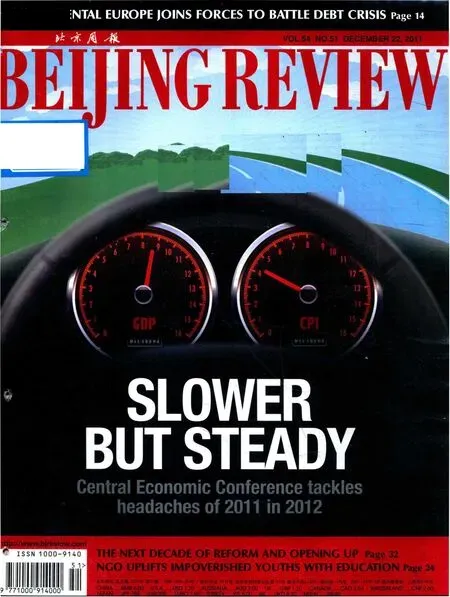China Reaches Out to Eurasia
2011-10-14ByYUYAN
By YU YAN
China Reaches Out to Eurasia
By YU YAN
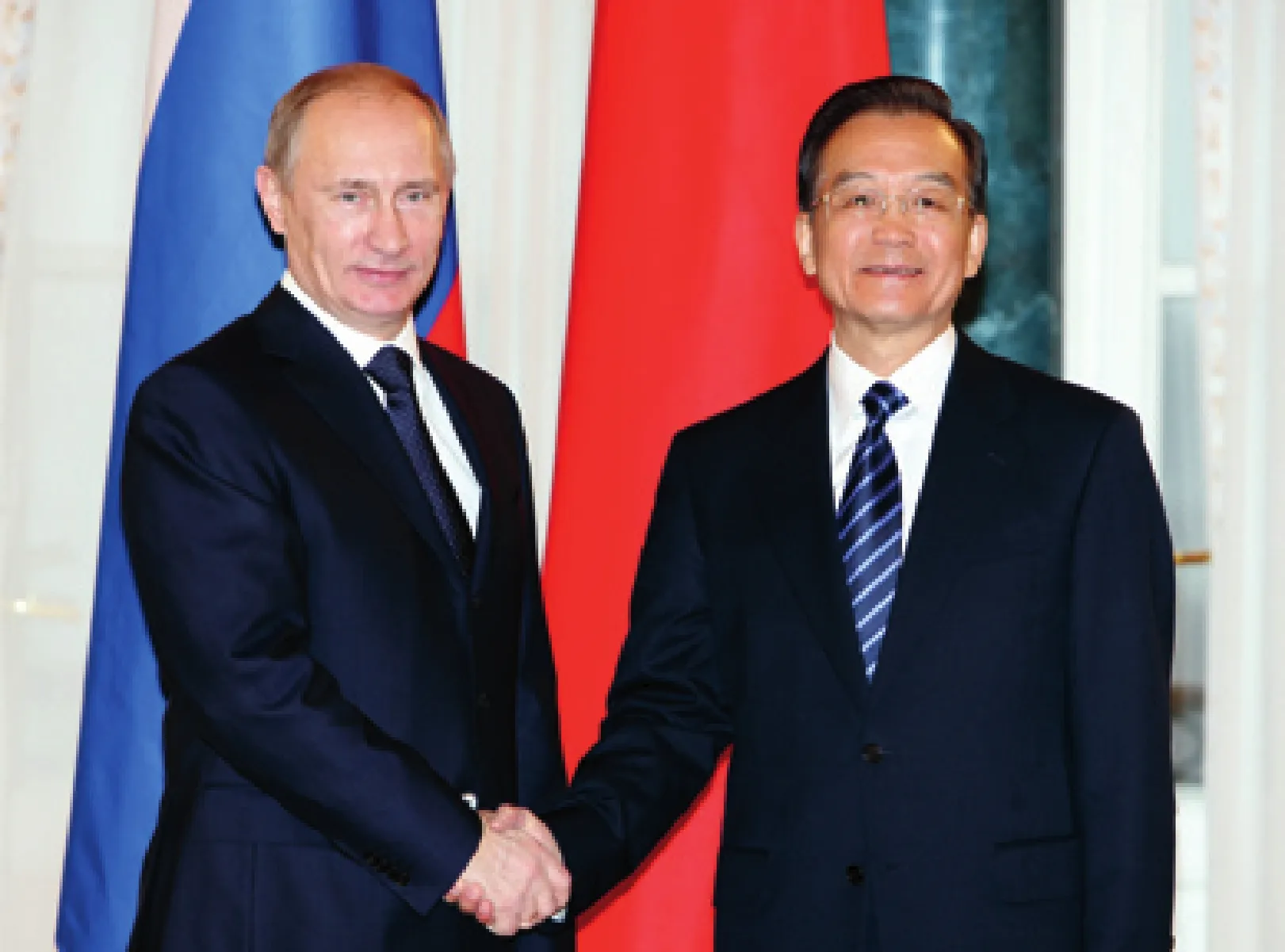
REGULAR MEETING: Chinese Premier Wen Jiabao meets with Russian Prime Minister Vladimir Putin in St. Petersburg on November 23, marking the 15th annual meeting between Chinese and Russian prime ministers
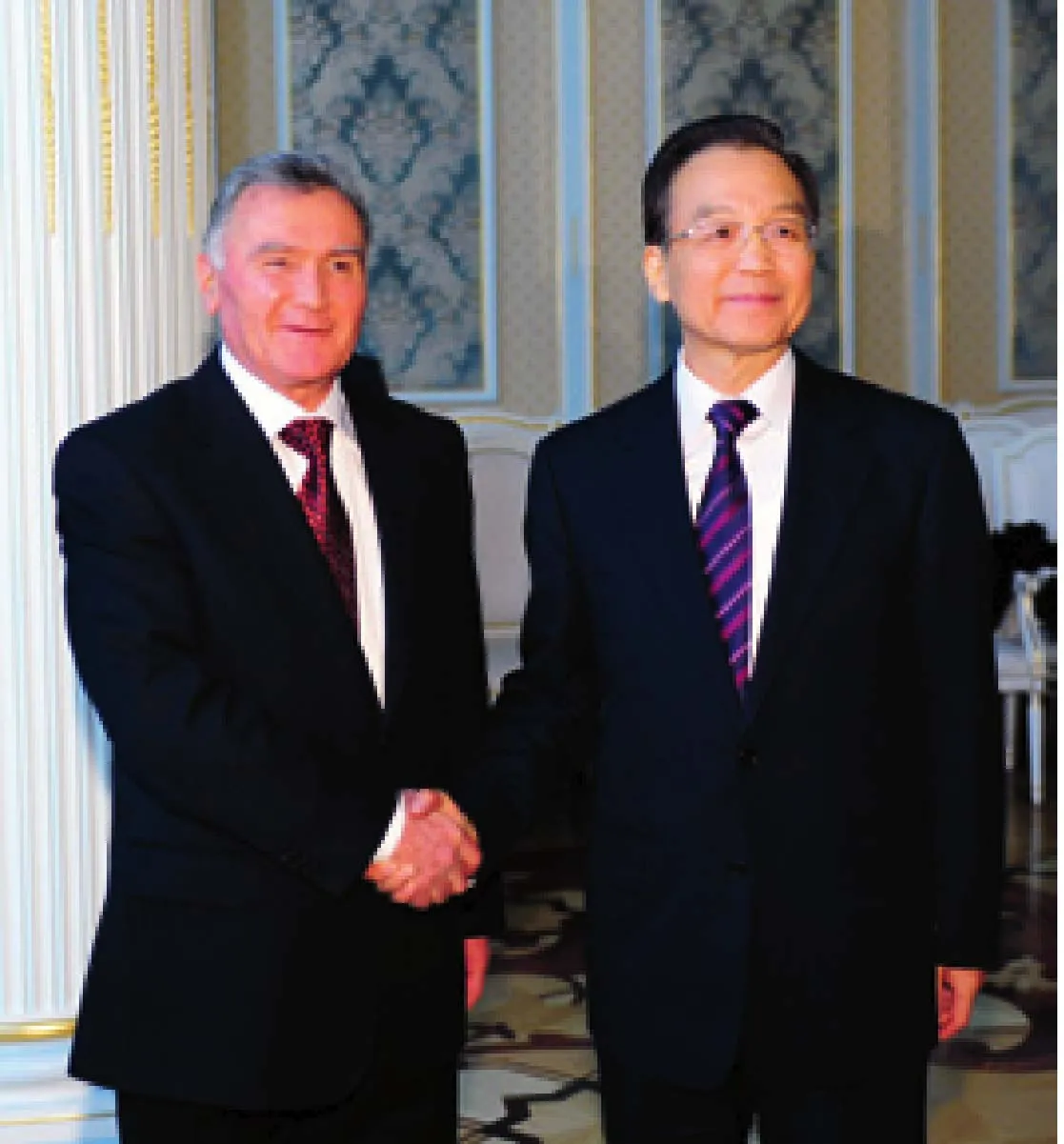
FIRM PARTNERS: Chinese Premier Wen Jiabao shakes hands with Tajik Prime Minister Akil Akilov in Dushanbe on November 25
Premier Wen Jiabao’s visit to Russia and Tajikistan strengthens trust and cooperation
Political ties and economic cooperation were strengthened between China and the Eurasia region countries,when Chinese Premier Wen Jiabao undertook a round of high-level diplomacy in Russia and Tajikistan.
Wen’s activities included official visits to the two countries, a meeting with the Russian prime minister and participation in the ninth annual Shanghai Cooperation Organization (SCO) prime ministerial meeting in Dushanbe, Tajikistan. Chinese Foreign Minister Yang Jiechi called Wen’s trip on November 22-25 a “major diplomatic action of China” in the region.
China also signed a total of 50 bilateral and multilateral documents in association with Wen’s visits.SCO summit
Wen joined leaders of the fi ve other SCO member countries—Russia, Kazakhstan,Kyrgyzstan, Tajikistan and Uzbekistan—for the group’s one-day meeting on November 25.
“Economic cooperation was emphasized at this meeting,” said Wang Lijiu,a research fellow at the China Institutes of Contemporary International Relations(CICIR).
The emphasis on economic cooperation represents a shift from the group’s original focus. The SCO was formed in 2001 as a non-military alliance devoted to improving mutual security in Central Asia.
Security remains an important concern of the group, however. At the meeting, SCO prime ministers agreed to intensify the fi ght against the “three evil forces” of extremism,separatism and terrorism, and to safeguard regional security and stability. Speaking to the group, Wen called on SCO countries to rely on their collective power to better safeguard regional peace and stability.
Since the 2008 global financial crisis,however, economic ties among the member states have strengthened. From January to October, for example, China’s trade volume with SCO member states reached $67.9 billion, up 37.4 percent from the previous year.
In order to secure the group’s growing economic ties, prime ministers pledged to enhance coordination in economic policy in order to promote trade and investment. In addition,they promised to deepen cooperation in disaster relief, education and culture and promote sustainable development in the region.
To help achieve the group’s goals, Wen called for deepening fi nancial and monetary cooperation among SCO member states.He said members should expand business financing channels, conduct research on establishing an SCO development bank, and expand cooperation on local currency settlement issues in order to promote regional economic cooperation and trade.
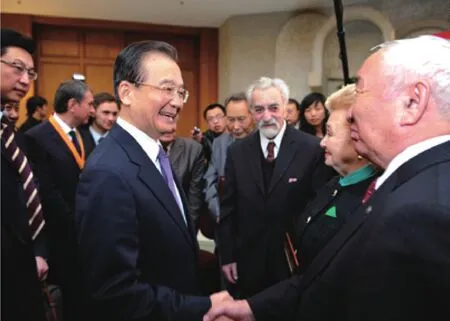
CORDIAL CHAT: Chinese Premier Wen Jiabao chats with Russian representatives after presenting awards for outstanding contributions in Sino-Russian energy cooperation and Chinese language and cultureat a ceremony in Russia on November 24
Wen also urged members to promote comprehensive and balanced economic,social and cultural development. The move,said the premier, would not only help member states, but also help make the SCO more united and appealing to others.
Russian visit
Wen met with Russian Prime Minister Vladimir Putin on November 22, marking the 15th annual meeting between Chinese and Russian prime ministers.
During the meeting, Wen told Putin the China-Russia strategic partnership has developed to an unprecedentedly high level, and has a solid foundation and huge potential.Wen said the partnership provides strategic support for each country’s respective development and serves as an important guarantee for world peace and stability. Wen also said developing ties with Russia is a priority of China’s foreign policy.
Wen’s following talks with Russian President Dmitry Medvedev came only two months after their meeting in Beijing.The dialogue took place against the backdrop of heightened tensions on the Korean Peninsula, after North Korea and South Korea exchanged fi re on November 23.
Wen and Medvedev agreed that restarting six-party talks is essential to securing stability and denuclearization on the peninsula. They agreed China and Russia should work vigorously to achieve this goal.Medvedev said Russia is ready to cooperate with China within bilateral and multilateral frameworks to keep peace and stability on the peninsula.
Russia’s willingness to participate in security cooperation in the region is quite valuable, especially in the absence of a fi xed military and political mechanism—like NATO—in the Asia Paci fi c region, said Liu Guiling, another research fellow with CICIR,
The two sides also said China and Russia will use the yuan and the ruble in bilateral trade settlement. The Russian ruble is already traded on the Chinese stock exchange. The Chinese yuan is starting trading in Moscow in December. Liu said this move will safeguard the two countries’ economic security and facilitate future bilateral trade.
Strengthening energy cooperation was also on the agenda of the two nations. Wen said both China and Russia should deepen bilateral cooperation in gas and oil, nuclear energy, coal, power and other fi elds.
In fact, the China-Russia oil pipeline—years in construction—was completed this year,signaling a new stage in energy cooperation between the two countries. Medvedev opened the Chinese section of the pipeline during his visit to China in September. The project is important because it will allow Russia to diversify its energy exports and make China’s external energy supply more secure.
With the completion of the pipeline,cooperation in the areas of crude oil extraction, transportation, processing and sales will speed up. According to an agreement signed last year, China will loan $25 billion to Russia, in exchange for 15 million tons of oil each year from 2011 to 2030. In the meantime, China and Russia are expected to reach an agreement next year for Russia to supply China 30 billion cubic meters of gas annually beginning in 2015.
From January to October, China’s trade volume with SCO member states reached$67.9 billion, up 37.4 percent from the previous year
China-Tajik bonds
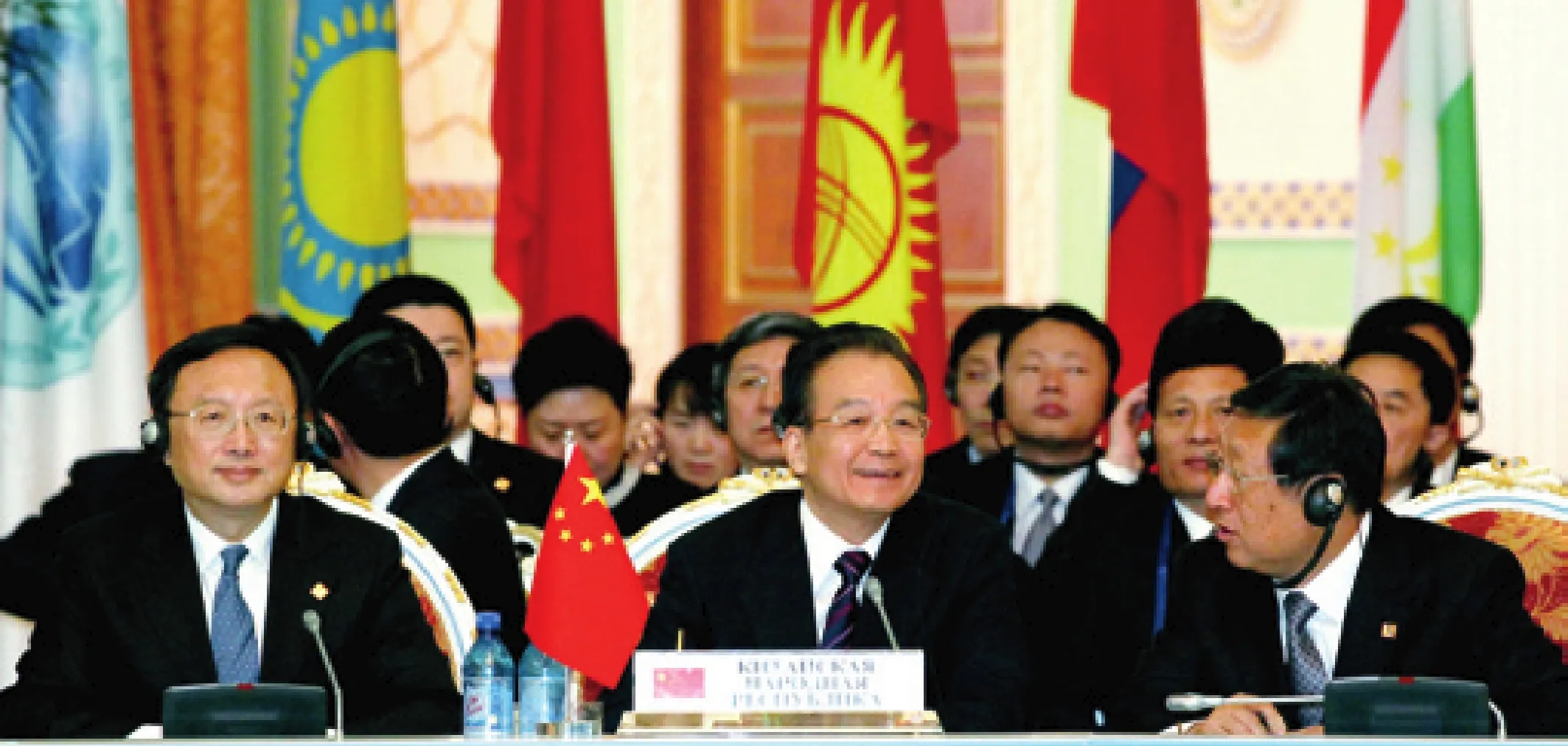
MEETING OF TOP MINDS: Chinese Premier Wen Jiabao (center) attends the ninth SCO prime ministers’ meeting in Dushanbe, Tajikistan, on November 25
Wen’s meetings with Tajik President Emomali Rahmon and Prime Minister Akil Akilov during his recent visit to Tajikistan underscored the importance of relations between the two countries.
“The bilateral cooperation between China and Tajikistan has developed steadily all these years. Their cooperation serves as a good example of China’s cooperation with other SCO member states,” said Wang of CICIR.
Since the two countries established diplomatic ties 18 years ago, bilateral relations have enjoyed healthy and steady development and have borne much fruit.
The rapid increase in economic activity between the two countries is a measure of growing ties. Trade increased from $10.76 million in 2001 to $1.5 billion in 2008. Even in 2009, under the impact of the financial crisis, trade still hit $1.4 billion. Now China is Tajikistan’s second largest trading partner.
The two countries have also cooperated in other areas. China supported Tajikistan in 2009 when it suffered from natural disasters and terrorist threats.
Speaking with the Tajik prime minister, Wen said the development of relations between China and Tajikistan has brought real benefits to the two peoples. Wen also said China attaches great importance to cooperation with Tajikistan in such fields as transportation, electricity and infrastructure.He said he hopes the two sides will strengthen coordination and effectively implement China’s aid projects in Tajikistan. He also said he hoped China and Tajikistan will cooperate in the mining and agriculture sectors to promote common development.
Akilov said the implementation of major cooperation projects plays an important role in helping improve the livelihood of the Tajik people. He said bilateral relations are truly good enough to serve as a model for friendly cooperation between a big country and its neighbors.
Akilov also said he welcomed more Chinese enterprises to establish businesses and invest in Tajikistan, especially in the fields of mineral resources, agriculture and transportation.
After their talks, the two leaders signed a joint communiqué and witnessed the signing of bilateral cooperation agreements in agriculture, fi nance, electricity and transportation.
